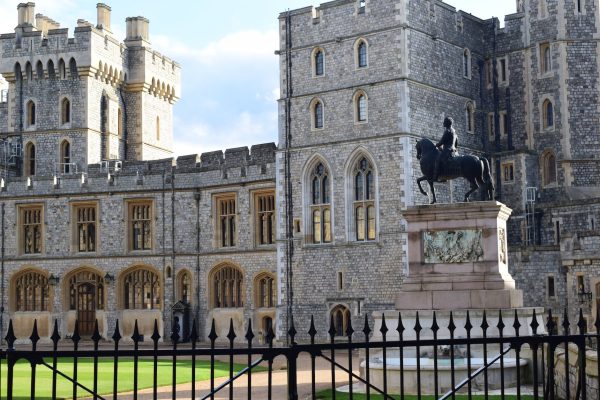By Stephen Fry
A reflection on England and monarchy, from Happy & Glorious: A Royal Celebration.
Forgive me, I am English!
I was born in the County of Middlesex (which no longer exists). I live in Surrey, England, which apparently is part of a State known both as the United Kingdom and as Great Britain. I am not Scottish. I am not Irish (part of the British Isles but only the northern counties are part of the United Kingdom)—stay with me—and I do not feel British; because I do not understand what that means. For the purposes of my attempt at recognising what my nationality is, the Principality of Wales is not a country. I am of the people. I hold the franchise afforded to me by the freedoms of democracy. I am naturally a radical, a conservative a libertarian; perhaps.
All the above came whistling into my mind as the uncoded British Constitution was rolled out for all to see as the days similarly rolled out following the death of our late Sovereign Lady, Elizabeth. Presented on television as a spectacle, an odd group of happenings where people used interesting language, wore even odder clothes, blew trumpets, marched in grand military liturgy. That was happening?
The British Constitution is not written down, as I mentioned above, the Union exists as a tension of relationships: The Palace of Westminster, Parliament; the Law Courts, the Judiciary; the Palace of Lambeth, the English Church; the Military—all operating in a substantive balance or tension of checks. All held together by the Monarchy, the person of the Sovereign. As an aside, for a moment, government ceased to exist with the death of Elizabeth. Power was transferred to the Privy Council to note the accession of the new king; after which the machinery of government had to make a fresh declaration in recognising a new Sovereign and thereby being allowed by this tension to continue its work in government. All very odd in a democracy—the people choose—but nonetheless even the franchise is checked with balances of the establishment.
Imagine the surprise for those who listened to the acclamations, the declaration of the new king by the Heralds, to discover that London is not part of the United Kingdom! Seriously? Ask why the Monarch must yield to the Lord Mayor of London as they enter the City. All of this is the wonderful mystery of the English Monarchy that binds a people, a state, a system with only one aim, to protect and defend the Monarch and the Peoples of the realm.
Step back in time with me. George V; George Frederick Ernest Albert of Saxe-Coburg and Gotha; June 3, 1865-January 20, 1936. He led the paradox of the Royal Revolution in 1917. It is this action that saved and gave us the monarchy we have in 2023. He was profoundly conservative, devoted to regular routines. A great diarist. A hater of pressed, creased, trousers and turnups, no modernity; yet a revolutionary. Upon his accession to the throne in 1910, his view was maintained, ceremony and splendour, tradition and ceremony.
The Coronation of George was, outrageous in its splendour—liturgically, musically solemnity—disciplined, organised, and rehearsed. Why? For the first time there was an understanding that the Monarchy was now watched by a new audience—the Peoples of the Realm. The Populus wanted to see, wanted to be involved, they wanted a good show, they wanted a performance. George gave them that; he was not a natural to this public display of kingship, but he was a conservative. George knew that the ceremony of State, acted by a king, by him was in fact his duty. This idea of duty became the touchstone and power base of monarchy, continued by George VI following the abandonment by Edward VII, and passed on to the psyche of Elizabeth II.
George was a democrat, as monarch, he presided over the divisions between the House of Commons and the House of Lords. He signed the Parliament Act of 1911 which destroyed the independence of the House of Lords. This meant that the Monarchy could survive as the aristocracy became replaced, drop by drop, of his new audience, the people. He celebrated the people by completely restructuring the great, enormous public space for people, in front of Buckingham Palace, who could greet their king and his people—Admiralty Arch, the Mall, the Victoria Memorial—a public piazza, a theatre for ceremony, for the engagement between people and king. All of this is George’s interpretation of the continuum, originating from his father Edward VII, but emphasising his own understanding of people, power, authority, and constitutional tension.
Edward VII had a great pride in friendship. His love of France (a new relationship) was similarly adopted by George and led a nation away from the revolutions of Europe—the falls of Russian, Germany, Austria, etc.—and into a war victory on the battlefields of Ypres. People and Sovereign, united by victory, united by the mobilisation of men and women in a just cause—attacked by demands for a republican society by H.G. Wells and other Fabian Socialists, and supported by the unmentioned stirrings of rebellion and mutiny with a huge rise in the casualty rates of a poorly orchestrated war.
There was even a suggestion that George was…….foreign—a man presiding over a dull alien Court! George becomes frightened, his rush to engage with his audience, the people, all seem to be failing. His sense of duty may not be enough. The first king to speak only English. His nerve was shaking, the Royal House was German. The marriage rules of the German Royal House required only marriages back in Germany! Every generation would re-Germanise the Royal Household, the Royal family, the next generation of Sovereign.
George realises the problem. He sees a war with Germany, his own people. He realises that something must be done. He cannot end the war without a victory, he will not get a victory unless he ceases to be seen as a German. The Royal House must change its name and its Royal Customs. What should he be called? What would the people accept as an English name for an English king?
Windsor is born. The Town is the seat of the Garter, it is home to legend, pageantry. The name is declared in Council. The whole Royal family are rebranded—Battenburgs are Mountbatten, Saxe-Coburg and Gotha is now Windsor. At the same meeting of the Council George declares that the marriage customs have changed, and the Royals will now marry English people. The summer of 1917 saw the end of a German dynasty and returned the Monarchy to a national possession, a family of the people. The way in which the relationship between the subjects, the people, the citizens are now integrated.
George has democratised the Palace of Westminster, Commons over the Lords. Government for the people, for the many not for the few. With this he created a new structure, an order; a reward open for the people. The new Orders of Royal validation, the first investitures, the OBEs the MBEs, the CBEs the Knights of the Grand Cross, all changed. All new, a new engagement and reward for the people. Populism was sentimental and public. The very first of a new Order, the innovation, was presented to the people in public. Not a Palace, not in Westminster, not in London; but in a sports stadium, Ibrox park, in Glasgow Scotland. The revolution, the Royal Revolution was complete.
Come back to 2023, now we have a new king, a new Prince of Wales, a slimmed down Royal family. All very English-looking now. All very populist, all very egalitarian, all very effective. Effective because of Queen Elizabeth promising at the beginning of her reign to follow in the footsteps of her grandfather, George V. The revolutionary king who was a conservative, ahead of the curve, discerning, informed, and well advised. The man who saved the monarchy and made it what it is today. His inheritor, King Charles III, a similar man, a man who listens, who acts, who speaks out for the people, a people’s king; a man who understands the relationship between Sovereign and his Peoples.

